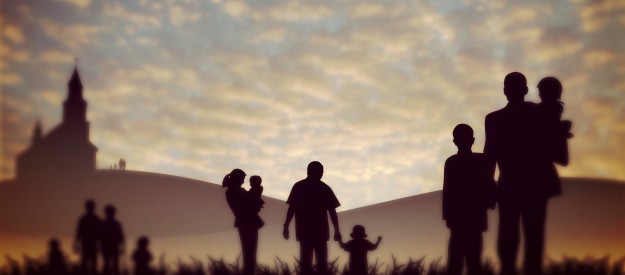"We are losing our attitude of wonder, of contemplation, of listening to creation and thus we no longer manage to interpret within it what Benedict XVI calls 'the rhythm of the love-story between God and man.'"
+ Pope Francis
On fifteen years back home

Fifteen years ago this month I went to Sunday Mass for the first time in two decades. I returned to full Communion a few months later. Thus ended long stretches of post-Confirmation ex-Catholic agnosticism—years peppered with paganism and bouts of atheism.
The reason I came back is, first, God—the prime mover and shaker in our lives. But if you ask what was it about the Church that made me want to return, the answer is simple. The Church’s teachings are true. They solve and often prevent the problems we regularly face.
My decision to come home was due in large part to the fine, logically consistent answers that I received to all the many, many questions I asked clergy that I had become friendly with. (I was lucky to be invited—repeatedly—back to Mass by a joyful priest who didn’t mind all my questions. Nor did his brother priests.)
Keep in mind that I had been an environmental regulator for just over a decade when I went to Mass in August 1999. I had become aware that human governance and reason could only take us so far. And so I was open to answers about what else was needed for the salvation that eluded us.
In time, my profession and my writings convinced me of this: As with the human variety, ecological salvation requires us to accept and cooperate with God’s transformative, loving, nature-elevating grace.
This weekend I’ve been reading David W. Orr’s Earth in Mind: On Education, Environment, and the Human Prospect (Island Press, 2004), which may be one of the texts that I and my colleague use in our sustainability colloquium next spring. It’s a great read. It sounds the same alarms that many of us do about the modern West, especially about education and the ecological crises that are growing as you and I read this sentence. And while I agree with many of the solutions that Orr proposes, there’s something missing. How do we convince all people everywhere to love each other and the earth, or to consider the implications of our activity and consumption? How do we get people to act selflessly?
To answer those sorts of questions, we must recognize that the solutions we seek are not in ourselves—they are in our relationship with God.
Before I returned to the Church, I might have read Orr’s book without giving much thought to what it didn’t answer. Today I know that our faults are too much a part of who we are for any of us to resolve them or to overcome them simply because it is right and just to do. St. Paul says it plainly: “all have sinned and are deprived of the glory of God” (Romans 3:23). And yet we are also all offered a return to that glory, if only we heed the invitations, listen to the answers to our questions, and consider that since our ways are not working out well, we should trust in God’s ways, and so orient ourselves accordingly, even if it is difficult.
Fifteen years and one month ago, I would have scoffed at such words. Now I am writing them for the world to see. Funny how God works, no? But I am so very grateful that He does what He does—that He comes after lost sheep like me and that He uses His creatures to do things like write blogs that might answer a question or two that others are asking.
In other words, It is a joy to be back home and to be journeying onward with all of you.
Glory be to the Father, and to the Son, and to the Holy Spirit. As it was in the beginning, is now, and ever shall be, world without end. Amen.


















